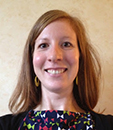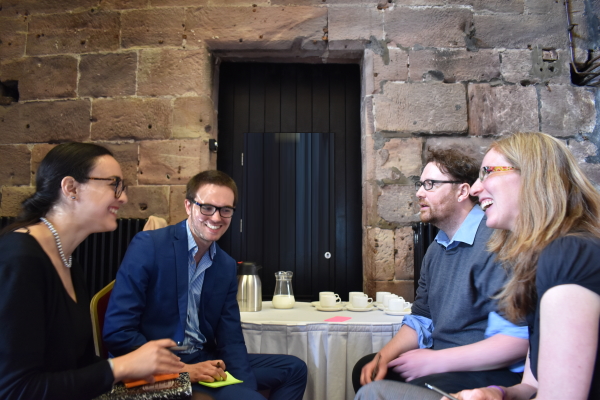
We asked Sarah Knight, one of our original #DataImpactFellows, to share her thoughts on what being a Fellow meant for her.
I was a Data Impact Fellow in the 2016-2018 cohort, but I am still a Data Impact Fellow today! You never leave.
I’m still learning what impact is and how it affects my research. Aren’t we all? You probably are if you are reading this blog!
Being a Fellow has benefited me in a number of ways when thinking about data impact and impactful research: time to think and learn, the creation of new communities, and enabling impactful activities. Let’s take a look at each in turn.
Space and time to think about impact
Being a Fellow takes you away from your desk and creates a space for you to think and learn about data impact. What constitutes impact, examples of what impact is (and isn’t!) and how we as researchers can navigate, plan and measure the impact that our research has.
Before becoming a fellow I thought I knew what impact was…but it turns out I had only scratched the surface.
Some things I learnt:
- There are different definitions of impact (e.g. that of ESRC, the REF, my own university).
- There are policies and requirements for research impact in academia and beyond.
- The difference between engagement/dissemination and impact.
- That really you can’t DO impact…
- …not by yourself anyway. You can only plan for it, by designing activities that engage and exchange with stakeholders and beneficiaries, to encourage and facilitate impact.
- There are many ways to measure impact and many tools to help you.
Being a fellow allows you space to learn. BUT knowledge is not enough….
New friends, new conversations, new opportunities
Being a Fellow opens up several opportunities to meet new and exciting people.
The fellows themselves come from a variety of backgrounds, disciplines and data skills. It is fascinating to learn how data is being used in these different areas, and how we all have similar and sometime surprising issues that come with the territory.
The best visualisation technique? What to do with missing values? Why do I find myself using several coding programmes at the same time? You are amongst friends with this gang.
Being a Fellow gives you a platform.
I’ve had the opportunity to take part in Twitter chats about data impact, talk about my work and write blogs about it that reach a new and wide audience. This is important, not only for disseminating your work and your thoughts, but it creates content and discussion that will hopefully be useful to others who are on their impact journey too.

Image: (from right) Sarah Knight with Fellows Stuart Campbell, David Kingman and Claudia Zucca
Paths to impact
As a Fellow I’ve enjoyed being part of knowledge exchange activities aiming to ultimately increase the impact of my research. Two examples:
- Landscape and Human Health conference, Vienna 2017. The budget assigned to each fellow allowed me to present my work to a new international audience. The conference was a very rewarding experience, where I forged new collaborations and discussed the use of longitudinal well-being data in an area where it is not so common. (I also won a poster prize!)
- Public outreach event, Sheffield 2017. I designed, carried out and evaluated a public outreach event on air pollution, biodiversity and health called AirFest.
As a fellow I used this event to consider how impact is measured or captured, and how difficult it can be. We ran activities relating to air pollution in the city, including a participatory mapping exercise, a lichen identification activity and an online quiz. Despite the rain that day, we talked to many people. Adults seemed very surprised by our pollution facts, and appeared to engage enthusiastically with the big map of Sheffield, while children enjoyed touching the lichen samples and making lichen beards! I was able to discuss my use of well-being and pollution data with several groups of people and we had some great exchanges about what data is available, what well-being means, how you measure it and how you connect it to data about the physical environment. I myself developed new understanding about people’s concerns and behaviours regarding air pollution, and the possible pathways in which this may affect their self-reported well-being.

Image: Sarah at AirFest
Finally….
Being a Data Impact Fellow is extremely rewarding, personally and professionally.
Ultimately I think it has improved my research and research activities, in carefully considering how I will work, with who, and when. It has also highlighted to me that tasks I carry out regularly and that I never considered as being impactful, such as delivering teaching and training, are key pathways to having impact. And that no matter how much you plan your impact, you can never fully expect what will happen.
Impact happens in the most surprising places!
About the author
Sarah Knight (@sarah_gis) is a PhD student in the Environment Department of the University of York, as well as the part-time Participatory GIS Technician for the PERICLES project.
PERICLES is an EU-funded Horizon 2020 research and innovation project running until 2021. The project promotes sustainable, participatory governance of cultural heritage in European coastal and maritime regions. The project has 11 partner organisations across Europe and studies 8 case regions (the Aegean Sea, Brittany, Denmark, Ireland-Scotland, Estonia, Malta, Portugal, and the Wadden Sea). Sarah’s role at the University of York is to manage the project participatory online mapping portal. The portal is a key part of PERICLES, used by each case region to capture the tangible and intangible maritime cultural heritage from local stakeholders.
